The 3rd Asia-Pacific CBR Congress
Portage for Asian Countries:
Activities of JPA and Overview of the Portage Early Education Program
Japan Portage Association
(email:jpa@a-net.email.ne.jp; http://japan-portage.org)
〈Brief History of JPA〉
In 1985, Japan Portage Association (JPA) was established to promote the Portage Early Education Program throughout the country and Asian region. The aim of the Portage Early Education Program is to provide the early education to the children with developmental delays from age zero, and to support as well as for their families. The Portage Early Education Program developed by the Cooperative Educational Service Agency, CESA 5 in Wisconsin, USA and was published as the “Portage Guide to Early Education: PGEE” in 1972. In Japan, the study started from 1980 to adjust the program to Japanese culture. In 1983, Japanese version of the program the “Portage Early Education Program” was published. In 2005, JPA incorporated the feedbacks from more than 20 years of experiences and the newly revised Japanese edition of PGEE, the “New Portage Early Education Program” was published and it is made to meet the current conditions of Japanese culture and society.
Today, the Portage Early Education Program is widely used for many countries worldwide, especially for CBR activities in the developing countries. JPA has 50 chapters around the country and nearly 1,000 of the members are active. JPA celebrated the 30th anniversary on 28, June in 2015.
〈The Portage Early Education Program〉
Feature of the Portage Early Education Program
The program has distinct features as follows:
- It is an individual program to designed to suit individual development of each child
- The parents play the central role in the teachings and the teaching takes place at home in daily life settings.
- Teaching methods are based on the principle of applied behavior analysis, and the objectives of the teachings and its results are precisely recorded.
Contents of the Portage Early Education Program
The Portage Early Education Program recognizes 6 developmental domains; Infant Development, Social, Language, Self-help, Cognitive, and Motor. For each domain, the sequences of skills to be acquired for the developmental ages zero to 6 are listed in the Checklist. There are total of 576 of such behavioral objectives. They are color-coded depending on the domain they belong to, and listed in the order of development in the Checklist.
Also, there is the Card File. The Activity Cards which list one behavioral objective on each are in the File. On the Card, it also suggests teaching idea, assisting method, or sample aiding activities. The Developmental Progress Chart is included in the checklist. The Chart allows apparent observation on children’s progress.
Along with the Checklist, Card File, and Developmental Progress Chart, the Handbook to guide how to use them consist the materials of the revised the“New Portage Early Education Program”.
Teaching Methods
The teaching starts with developmental assessment using the Checklist measuring the accurate level of the child’s development. Based on the assessment, Portage Consultants discuss with parents and select target activities. The activities are selected from each domain. According to the child’s developmental level, the target activities may be broken into smaller steps so that the child can gain a new skill following the steps. Portage Consultants will write down the tentative target activities for the next meeting so the parents can take over the teaching at home. After a week or a month, Portage Consultants will assess the progress and proceed to the next target activities. Portage Consultants does not teach the child directly; the parents do. Portage Consultants transfers their teaching skills to the parents. The “parent-centered teaching” is the distinctive feature of the Portage Early Education Program.
Teaching Techniques
A target activity selected from the Checklist may be analyzed and broken down into the attainable smaller steps to suit child’s developmental stage. This is called “task analysis”.
In this process, appropriate aids are necessary. Such aids include physical assistance, visual assistance, verbal assistance, and/or the combination of them. For these assistances, the techniques derived from applied behavior analysis are used such as “prompt” to give an appropriate assistance, or “fading” to lessen assistance gradually, or “chaining” to “chain” the similar activities to form more complicated activity. Also, the principles of reinforcement and extinction are used to praise the desired behaviors and to ignore the undesirable behaviors.
Parts of the Portage Teaching and Support for Parents
The Portage Teaching consists of the three parts. The first part is structured teaching using the Checklist based on the assessment, as described in the previous sections. The second part is to generalize the acquired skills in the daily life settings, and to maintain them. Then, the third part is to support and assist parents so they can home teach more easily. Portage Consultants positively involve the problems and concerns the parents have, and try to seek solutions together. It is important that Portage Consultants become good partners for parents to work together.
〈Some Activities of JPA〉
Seminars
Several times in every year, JPA conducts the Portage Training Seminars to train Portage Consultants. There are three-day seminar of introductory course and advanced course. After taking advanced seminar, Portage Consultants are eligible to submit for certification to the executive committee of the JPA. The participants of various occupational backgrounds have attended; day-care facilities, nurseries, kindergarten, special needs school, community health center, and so on. Also, many of parents, whose children took the Portage Early Education Program, attend the seminar and become Portage Consultants.
International Activities: Portage Early Education Program as CBR (Community-Based rehabilitation) activities
JPA is a member of the International Portage Association which was founded in 1988. International Portage Conference takes place every second year since 1986. It was held in Tokyo 1988 and in Hiroshima 1998.
JPA also conducted the Portage Program workshops in developing countries in Asia region those are Philippines, Bangladesh, Pakistan, China, Taiwan, Thailand, India and Nepal. CBR is a rehabilitation utilizing all human and material resources in the community and Portage teaching is home-based program for infants and young children which developmental age of 0-6, so the Portage Early Education Program is one of the most appropriate programs as CBR activities and effective in both developed and developing countries, especially effective in developing countries.
〈The Portage Early Education Program Workshop in Nepal〉
Portage and Rehabilitation Association Nepal (PRAN) and Nepal Portage Program (NPP) required support from JPA to provide service to children with developmental delays and disabilities of Nepal by adapting our experiences according to the condition of Nepal. Support from JPA will also be required to provide additional help in effective development of children and their quality living. JPA conducted the Portage Program Workshops for 3days at Banepa in 2012 and 2014, at Baglung in 2015.
Slide 1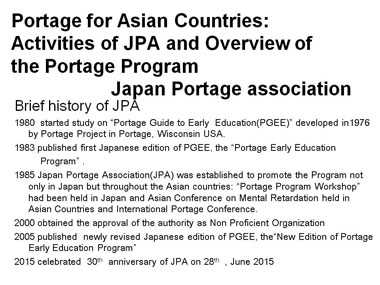 (Slide 1 text)
(Slide 1 text)
Slide 2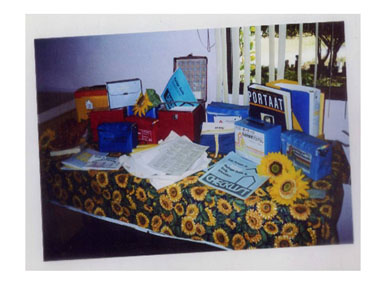
Slide 3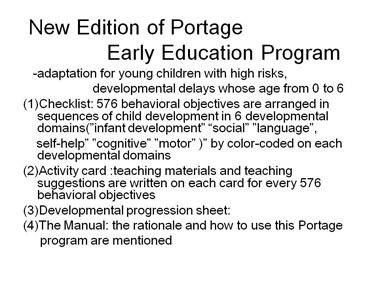 (Slide 3 text)
(Slide 3 text)
Slide 4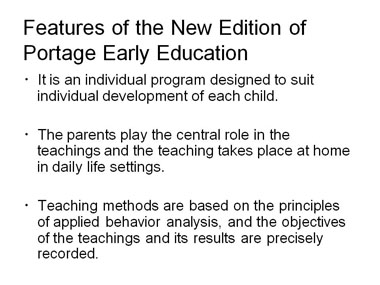 (Slide 4 text)
(Slide 4 text)
Slide 5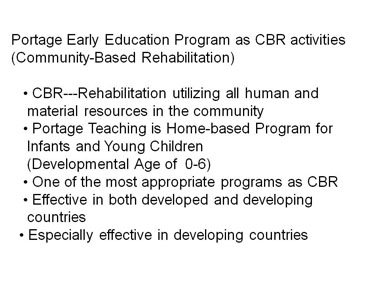 (Slide 5 text)
(Slide 5 text)
Slide 6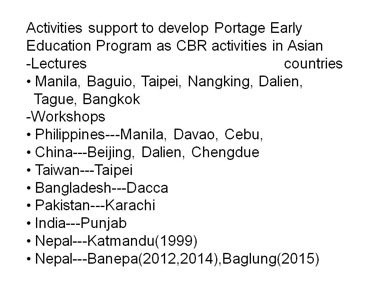 (Slide 6 text)
(Slide 6 text)
